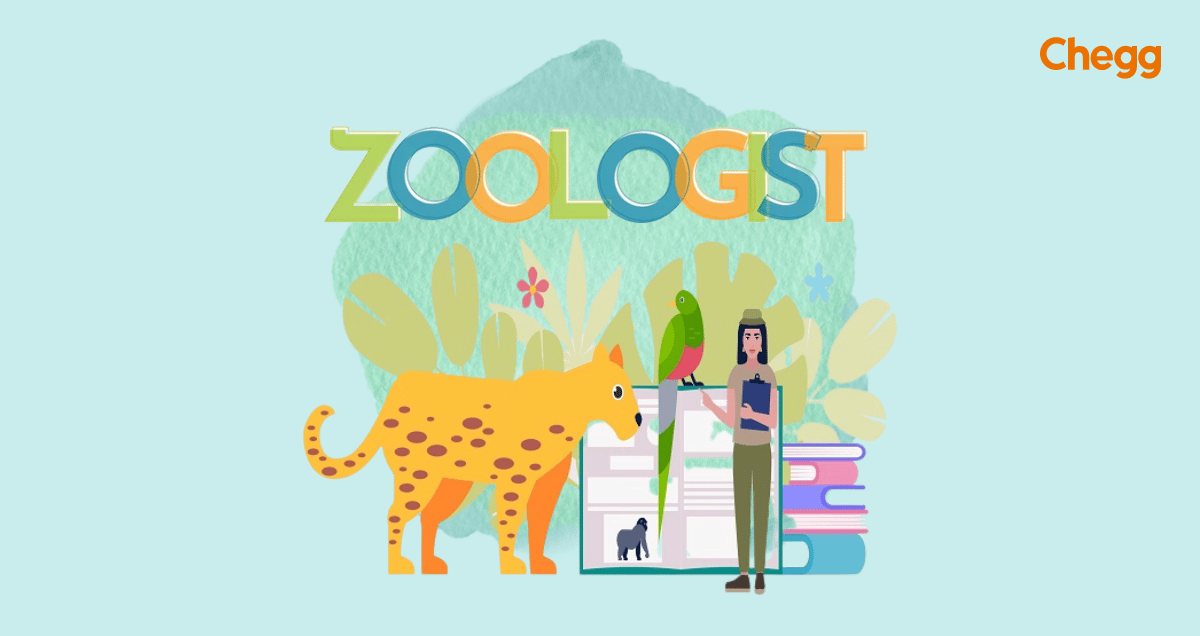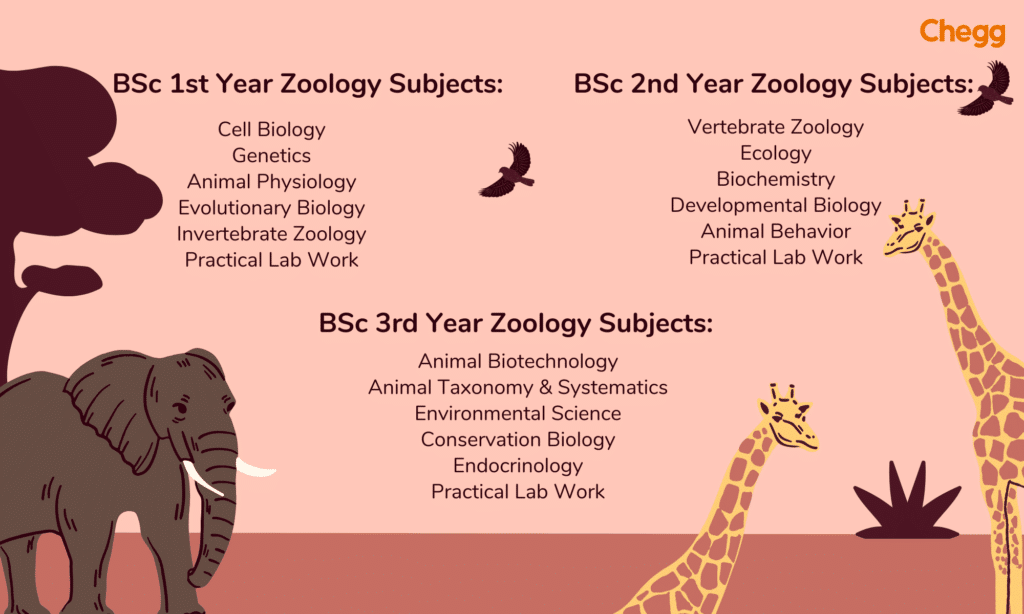

Quick Summary
Do you love animal life, biodiversity, and understanding the science of ecosystems? In 2025, a B.Sc. Zoology degree can be a pathway into an exciting world of discovery, and fulfilling conservation careers. The increasing priority in the world is wildlife conservation, which has increased the demand for zoologists, and zoologists with educational backgrounds rooted in a B.Sc. Zoology.
This student-centred guide reviews everything you should know about a B.Sc. Zoology course: From course structure to college, eligibility, and careers after graduation. It provides current information, advice, and examples for a variety of undergraduate paths for field research studies and the following career paths may suit your interests in wildlife management or teaching.
BSc Zoology is a three-year undergraduate degree program, and its syllabus focuses on the scientific study of animals and their behaviors, physiology, ecology, and evolution. It offers students a comprehensive understanding of the diverse aspects of the animal kingdom.
Moreover, a BSc Zoology degree equips students with diverse skills and knowledge that are highly valued in various sectors. Regarding the bsc in zoology scope, did you know, that according to the Bureau of Labor Statistics, the employment of zoologists and wildlife biologists is projected to grow 4% from 2020 to 2030.
Overall, pursuing a BSc course in this field offers students an exciting journey into the world of animals, their biology, and their impact on ecosystems.
The benefit of studying BSc zoology is that the curriculum is interesting and comprehensive. Anyone who is a wildlife and environmental enthusiast should pursue this course.
A BSc in Zoology also opens diverse career opportunities. Graduates can work in wildlife conservation, environmental management, research, and education. They might find employment in zoos, government agencies, and non-profit organizations dedicated to animal welfare and environmental protection. They can also work in the veterinary and biotechnology industries.
Moreover, the course offers good salary packages, usually between 4 lakhs and 7 lakhs per year. It provides a stable earning for the graduates.
|
Course Level |
Undergraduate |
|
Course Duration |
3 Years |
|
Full form |
Bachelor of Science in Zoology |
|
Eligibility | Candidates must clear 12th or an equivalent exam with a minimum of 55-60% marks. Some colleges also conduct an entrance admission test to admit freshers to the course. |
|
Subject |
Animal Physiology, Evolutionary Biology, Ecology, Genetics, etc. |
|
Top Colleges |
JMI New Delhi, Mount Carmel College, St. Xavier College, Fergusson College, etc. |
|
Average Annual Fees | Rs. 25,000 to 2,00,000 |
|
Top Recruiting Sectors |
Research Institutions, Zoos and Wildlife Organizations, Environmental Agencies, Education Sector, etc. |
|
Job Positions |
Wildlife Biologist, Research Assistant, Conservation Officer, Zookeeper, Environmental Consultant, etc. |
|
Average Annual Salary |
Around Rs. 5.7 lakhs (Salary can vary depending on factors such as experience, location, and job profile.) |
To pursue a BSc Zoology program, students must meet specific eligibility criteria and possess certain academic qualifications. Here are the essential requirements for admission:
It’s important to note that specific eligibility criteria may vary among institutions. Therefore, aspiring students should refer to the respective college or university’s admission guidelines for accurate and up-to-date information.
As a comprehensive program, BSc Zoology offers a well-structured curriculum that covers a range of subjects throughout the course duration. The program provides students with a deep understanding of the diverse aspects of zoology and equips them with the necessary knowledge and skills for a career in this field. Here is an overview of the key subjects covered in each year of the BSc Zoology program:
| 1st year | 2nd year | 3rd year |
| MicroBiology | Vertebrae Zoology | Animal Biotechnology |
| Animal Physiology | Ecology | Animal Taxonomy & Systematics |
| Evolutionary Biology | Biochemistry | Environmental Science |
| Genetics | Developmental Biology | Conservation Biology |
| Invertebrate Zoology | Animal Behavior | Endocrinology |

Note: The above list provides a general outline of the subjects covered in BSc Zoology. The specific subjects and syllabus may vary slightly between universities and colleges. It is recommended to refer to the official curriculum provided by the respective educational institution for detailed information on the subjects and syllabus.

The steps for the admission process for BSc Zoology are:
Note: The admission process and specific requirements may vary slightly between institutions. It is advisable to refer to the official websites of the institutions you are applying to for precise instructions and updated information.
Certain entrance exams are held every year through which students can apply to various universities. The exams are held in offline mode and primarily consist of verbal, analytical and knowledge-based MCQs.
Here’s the table with the expected registration and exam dates for CUCET, NPAT, CUET, and SET in 2025:
| Exam | Registration Open Date | Registration Closing Date | Exam Date |
|---|---|---|---|
| CUCET | March 2025 | April 2025 | May 2025 |
| NPAT | December 2024 | May 2025 | January to May 2025 (multiple sessions) |
| CUET | March 2025 | April 2025 | May 2025 |
| SET | December 2024 | April 2025 | May 2025 |
Note: The information is sourced from official sites and may vary.
| Section | Subjects Covered | Question Type | Number of Questions | Marking Scheme | Duration |
|---|---|---|---|---|---|
| Section 1: Biology | Zoology, Botany, Ecology, Evolution, Genetics | Multiple-Choice Questions (MCQs) | 45-50 | +1 for correct answer, -0.25 for incorrect answer | 75-90 minutes |
| Section 2: Chemistry | Organic, Inorganic, and Physical Chemistry | MCQs | 25-30 | +1 for correct answer, -0.25 for incorrect answer | 45-60 minutes |
| Section 3: General Knowledge/Logical Reasoning | Current Affairs, Logical Puzzles, Science Awareness | MCQs | 15-20 | +1 for correct answer, -0.25 for incorrect answer | 30-45 minutes |
| Total | Biology, Chemistry, GK/Reasoning | MCQs | 85-100 questions | Varies | 2-2.5 hours |
For the most accurate and updated details, make sure to check the official exam notifications.
The first step in preparing for the entrance exam is to have a thorough understanding of the current exam pattern. This will not only give you clarity about the exam process but also help you in time management. You should also know the complete syllabus of the entrance exam. While preparing for the entrance exam, keep the following tips in mind:
BSc Zoology syllabus with each subject for all semesters:
| Subject | Description |
|---|---|
| Systematic & Animal Diversity: Non-Chordate | Study of classification and diversity of invertebrate animals. |
| Principle of Ecology | Introduction to ecological principles, interactions, and ecosystems. |
| Chemistry/Botany | Basics of chemical concepts or plant sciences, depending on the choice. |
| Communicative English/Hindi | Development of communication skills in English or Hindi. |
| Subject | Description |
|---|---|
| Cell Biology | Study of cell structure, functions, and cellular processes. |
| Diversity of Chordates | Exploration of the classification and features of vertebrate animals. |
| Chemistry/Botany | Advanced concepts in chemistry or plant sciences, depending on the choice. |
| Environmental Science | Study of environmental issues, sustainability, and conservation practices. |
| Subject | Description |
|---|---|
| Biochemistry | Understanding the chemical processes within living organisms. |
| Endocrinology | Study of hormones and their role in physiological processes. |
| Mammalian Physiology | Examination of mammalian body systems and their functioning. |
| Chemistry/Botany | Further exploration of chemistry or botany topics, as chosen. |
| Subject | Description |
|---|---|
| Genetics | Study of inheritance, genes, and genetic variations in organisms. |
| Evolution & Population Genetics | Understanding evolutionary principles and genetic changes in populations. |
| Animal Behavior | Exploration of behavioral patterns and adaptations in animals. |
| Chemistry/Botany | Continued study of either chemical or plant science concepts. |
| Subject | Description |
|---|---|
| Immunology | Study of the immune system and defense mechanisms in organisms. |
| Developmental Biology | Examination of processes from fertilization to organismal development. |
| Subject | Description |
|---|---|
| Molecular Biology & Biotechnology | Study of molecular mechanisms and biotechnological applications. |
| Medical Zoology | Focus on parasitology, diseases, and their impact on human health. |
Here’s a table showcasing the top 10 colleges for BSc Zoology in India, including details such as college name, course duration, fees, and NIRF ranking (as of 2023):
|
College Name |
Course Duration |
Fees (Approx.) |
NIRF Ranking |
Miranda House | 3 years | ₹15,000-₹20,000 | 1 |
|
University of Delhi |
3 years |
₹30,000-₹40,000 |
2 |
Presidency College | 3 years | ₹20,000-₹30,000 | 3 |
|
St. Xavier’s College |
3 years |
₹25,000-₹35,000 | 5 |
|
Loyola College |
3 years |
₹40,000-₹50,000 | 7 |
| Kirori Mal College | 3 years | ₹40,000-₹45,000 | 9 |
University of Calcutta | 3 years | ₹15,000-₹25,000 | 12 |
Madras Christian College | 3 years | ₹50,000-₹60,000 | 16 |
|
Christ University |
3 years |
₹60,000-₹70,000 | 67 |
|
Fergusson College |
3 years |
₹20,000-₹30,000 | 79 |
There is a vast BSc Zoology scope for students passionate about understanding the animal kingdom. This section delves into the various aspects of the degree of bsc in zoology scope, including career prospects, research opportunities, and its impact on wildlife conservation. Let’s explore the exciting world of possibilities that await Zoology graduates.

|
Career Prospects | Job Roles and Responsibilities |
Average Annual Salary (in INR) |
|
Wildlife Conservation and Rehabilitation |
Wildlife Conservationist |
4-6 lakhs |
|
Wildlife Rehabilitation Specialist |
3-5 lakhs | |
|
Zoos and Aquariums |
Zookeeper |
2-4 lakhs |
|
Animal Behaviorist |
3-6 lakhs | |
|
Research and Academia |
Research Scientist | 6-13 lakhs |
|
Academic Faculty |
4-8 lakhs | |
|
Biotechnology and Pharmaceutical Industries |
Biotechnologist |
4-8 lakhs |
|
Pharmaceutical Researcher |
5-10 lakhs | |
|
Field Research |
Wildlife Biologist |
3-6 lakhs |
|
Biodiversity Researcher |
4-7 lakhs | |
|
Laboratory Research |
Animal Geneticist |
5-9 lakhs |
|
Comparative Physiologist |
4-7 lakhs | |
|
Conservation Education and Awareness |
Conservation Educator |
3-6 lakhs |
|
Outreach Coordinator |
3-5 lakhs | |
|
Environmental Sustainability and Conservation |
Habitat Restoration Specialist |
4-7 lakhs |
|
Environmental Consultant |
5-9 lakhs | |
|
Government and Public Service |
Wildlife Inspector |
4-6 lakhs |
|
Public Health Officer |
5-8 lakhs | |
|
Education and Outreach |
Zoology Teacher |
3-6 lakhs |
|
Science Communicator |
4-7 lakhs |
The field of zoology offers a wide range of career opportunities that span various sectors and specialities. Zoology graduates can contribute to wildlife conservation, engage in research and academia, explore biotechnology and pharmaceutical industries, and play a vital role in environmental sustainability. These career paths allow individuals to make a positive impact on the animal kingdom while addressing critical ecological and conservation challenges.
If considering earning a Bachelor of Science in Zoology, you will be glad to know that there are plenty of top recruiters looking for graduates like you. Key stakeholders in this field include organizations such as wildlife sanctuaries, zoos, environmental consulting firms, government agencies (such as the Fish and Wildlife Service), research institutes, and conservation groups. These employers are always looking for qualified zoologists who can conduct research, analyze data, and contribute to the protection of endangered species. So, if you have a passion for animals and conservation, rest assured that there are plenty of exciting career opportunities waiting for you after you graduate.
Follow these tips and you will be sure to pass your Zoology degree with flying colors.
Earning a B.Sc. in Zoology can be an exciting experience if you are interested in animals and the study of the environment. If you pursue the proper education, apply it through hands-on experience, and leverage the healthy curiosity it helps form, you can eventually have a fulfilling career in an applied field such as research, wildlife management, biotechnology, or education. As the importance of biodiversity and sustainable ecosystems becomes well-established in 2025, zoologists will be a significant part of exploring our understanding of the world.
And do not forget that once you finish your degree course, even if you want to be involved in an applied zoology career, you will still have to pursue your interests and an apprenticeship. To do so, get involved with fieldwork, internships, and pursue a degree or certification to make yourself well-studied in zoology. With your commitment and desire to study and continue learning, you’ll be in a good position to impact your career in zoology to help create a more sustainable environment.
Embarking on a journey in the captivating world of zoology? Explore our ultimate Career Advice, packed with invaluable insights and resources to empower your path towards a successful and fulfilling career in studying animals and their ecosystems.

Yes, pursuing a career in Zoology offers excellent opportunities. With a B.Sc., M.Sc., or Ph.D. in Zoology, you can secure jobs in both public and private sectors. The field of Zoology encompasses a wide range of diverse topics to study, providing bright prospects for individuals.
After completing a B.Sc. in Zoology, there are various career options available. You can work with organizations like the Zoological Survey of India (ZSI)or work in areas such as poultry farming, sericulture, or pisciculture. Along with these options, teaching, government exams and research are also some viable options.
B.Sc. Zoology is not inherently difficult but requires a genuine interest in the subject. Hard work, practice, and a deep curiosity about animal life and evolution will make the learning process easier and more enjoyable.
The choice between B.Sc. Botany and B.Sc. Zoology depends on individual interests. Botany focuses on the study of plant species, while Zoology deals with animal life. Both fields offer valuable career opportunities. The deciding factor should be your affinity for either plants or animals.
You are free to follow your chosen field and math is not a necessary subject. Students must have completed intermediate in science in either math, biology, or agriculture to be eligible for the degree course.
A Bachelor of Science in Zoology opens up a wide range of career paths in wildlife conservation, research, environmental consulting, and education. Graduates have the option to work with government bodies, non-governmental organizations, research facilities, and zoos, or they can continue their education to qualify for more advanced positions.
A Bachelor of Science in Zoology is a three-year undergraduate degree that emphasizes the exploration of animal biology, encompassing aspects such as anatomy, physiology, behavior, and evolutionary processes. The curriculum includes a range of subjects, including ecology, genetics, physiology, and conservation efforts.
High-salary jobs after a BSc in Zoology include wildlife biologist, zoologist, environmental consultant, and research scientist. With experience or higher studies, careers in biotechnology, pharmaceuticals, and conservation offer even better pay.
Zoology graduates can get government jobs as forest officers, wildlife biologists, or environmental scientists in departments like the Forest Department and Wildlife Institutes. They can also appear for UPSC, SSC, and state exams for various roles.

Authored by, Gagandeep Khokhar
Career Guidance Expert
Gagandeep is a content writer and strategist focused on creating high-performing, SEO-driven content that bridges the gap between learners and institutions. He crafts compelling narratives across blogs, landing pages, and email campaigns to drive engagement and build trust.
Editor's Recommendations
Chegg India does not ask for money to offer any opportunity with the company. We request you to be vigilant before sharing your personal and financial information with any third party. Beware of fraudulent activities claiming affiliation with our company and promising monetary rewards or benefits. Chegg India shall not be responsible for any losses resulting from such activities.
Chegg India does not ask for money to offer any opportunity with the company. We request you to be vigilant before sharing your personal and financial information with any third party. Beware of fraudulent activities claiming affiliation with our company and promising monetary rewards or benefits. Chegg India shall not be responsible for any losses resulting from such activities.